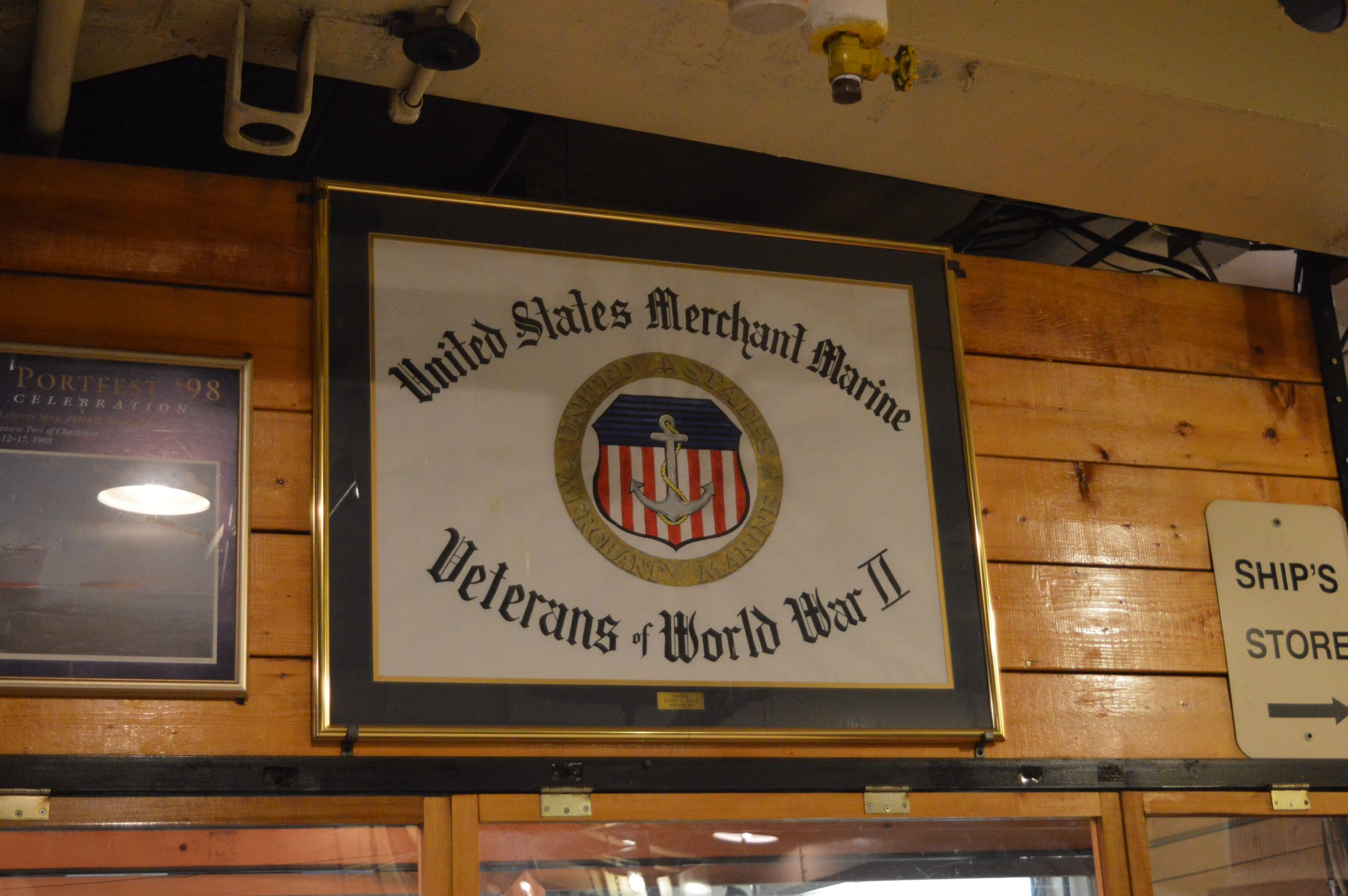Merchant Marine Vets Honored with Tour of John W. Brown
A plaque below deck of the Liberty ship John W. Brown pays tribute to the United States Merchant Marine Veterans of World War II. (credit Anthony C. Hayes)
BALTIMORE — Which branch of service statistically suffered the greatest loss of life during World War II? Some might guess it was the Army Air Corps, whose waves of bombers often flew dangerous missions over Germany without fighter support. Or the U.S. Marines, who battled deeply entrenched Japanese troops that were determined to hold out until the bitter end.
Both are good guesses, but neither is correct.
The surprising answer is the Merchant Marine – the branch charged with delivering the shiploads of goods which factories and farmers produced for FDR’s “Arsenal of Democracy.”
The branch that navigated tempestuous seas in hastily constructed cargo craft – imperiled by both nature and enemy submarines.
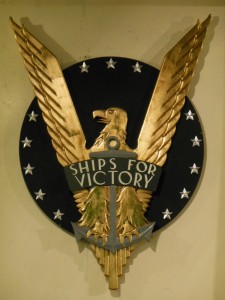
Nearly two dozen of the surviving veterans of America’s WWII maritime campaign are in Baltimore this week for the American Merchant Marine Veterans (AMMV) National Convention. As part of the program, the vets were feted yesterday with a visit to the John W. Brown – one of only two Liberty ships which are still operational.
Seattle resident Lee Cox – who once secretly chauffeured The Beatles, through throngs of unsuspecting fans, in an ambulance – basked in the familiarity of John W. Brown. Cox served aboard a number of ships during the war – including the Liberty ship Harold D. Whitehead.
“I went into the Merchant Marine when I was 16 years old and sailed pretty much all over the Pacific during and after the war. Some of ships I served on were the Harold D. Whitehead, the SS Mission Solano, which was an oil tanker, and the SS Texas – that was also a tanker. There were a couple more, but I can’t remember the names. I sailed until 1947.”
What does Cox think about this year’s AMMV convention?
“Oh, it’s great. For sure. I’ve wanted to attend for some time, but I couldn’t go to the others because they are held here on east coast, and I live in Seattle.
“I’ve done a lot of work for the AMMV. Written letters to Congress and made phone calls.”
Was it worth the effort?
“Oh, my. They are treating me like a king!”
I asked Cox if he could suggest a way that I might get similar treatment from the AMMV?
“Just put a couple of stars up there on your cap and tell them that you are a general.”
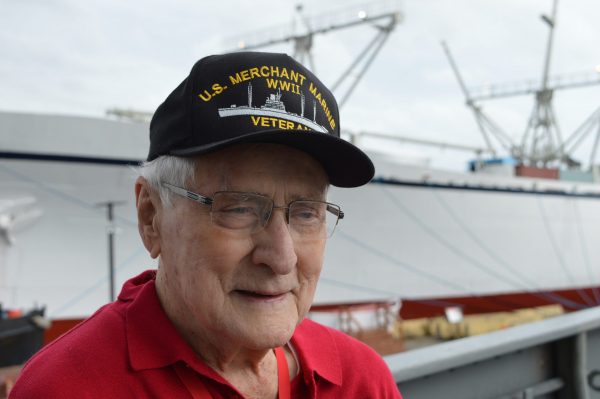
Texan native George Offenhauser’s ships – including the SS Wabash Victory – carried all manner of cargo to the Pacific Theatre – from diesel fuel for submarines and PT boats – to Hellcats and Corsairs slated for land and carrier service. But his most memorable load? A ship full of dynamite destined for the (thankfully) aborted invasion of Japan.
“We were anchored at Okinawa when the war came to an end. I don’t remember if they broadcast the official surrender aboard the Missouri over our ships loudspeaker. However, I DO recall seeing lots of empty whiskey bottles down in the mess hall. Where they came from, I still don’t know.”
And the dynamite?
“It became unstable and no one wanted us in their port. They didn’t even want to talk with us. I’m not sure how they finally disposed of it.”
Offenhauser’s daughter, Rosalie, said her father was never one to offer up war stories, but over the last few years, “He has really started talking about it.
“Now that he’s been going to the local Merchant Marine chapter, he is with the guys and they start telling stories.
“I would write notes like crazy as he talked and then type them up and take it back to him and see if it was correct. I currently have a scrapbook that’s about six inches thick.”
* * * *
GySgt Thomas G. Hill (USMC Ret) has a unique link to the Merchant Marine. His late father, Dr. Riley A. Hill, is one of the few members of the service to be awarded a Purple Heart during World War II.
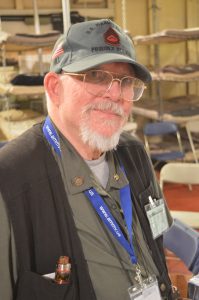
“My father was a cook during the war. When he came back, his brother talked him into finishing high school. Dad graduated in 1947, then borrowed $7,000 – which was a good chunk of change in those day – and put himself through medical school.
“They didn’t have the GI Bill back then, and Dad paid every penny of that loan off. You know, it wasn’t until 1988 that the Merchant Marines finally got their veterans status and were able to go to VA hospitals and things like that. A lot of people don’t realize what kind of a checkered history you’ve got as far as how the Merchant Marines have been viewed by our government.”
Hill told us his primary post-USMC endeavor involves speaking with WWII veterans about their service and later locating a picture of the ship(s) the vets served on. Hill then digitizes the old photos from black and white and colorizes the images. He makes two copies – one for each vet to keep, and a second which he has the veteran sign. The second photo is then sent to the Veterans History Museum of the Carolinas.
“I’ve corresponded over the last several years with many veterans and actually had the honor to meet some of these heroes. It’s truly humbling to see these 97, 98 year old veterans just now beginning to get the recognition that they so desperately deserved. In a lot of cases, they’ve only recently started talking about their experience. I didn’t even know my own dad was in the Merchant Marine until I retired from the military.
“These guys were so dumped on by our own government. Myself and several others have spent the last four or five years pounding on desks in Washington, just to get them this Congressional Gold Medal like the one they finally gave World War II veterans from the Philippines.”
* * * *
Fort Myers resident James Sciple spent three years in the Merchant Marine.
“It’s really irrelevant to my service, but I had a relative who was killed in France. He was the youngest soldier to be killed in the First World War. Fourteen years old – five months after he signed up.
“One day after I got out of high school, I got on a ship in New Orleans that went through the canal to Honolulu. There I got on a freighter with a civilian crew that was owned by the Army. Went down to New Guinea, from one place to another, just taking supplies right up to the invasion of the Philippines. For that, I moved to an LST. That was interesting.”
Sciple said he was anchored at Yokohama when the war finally came to an end.
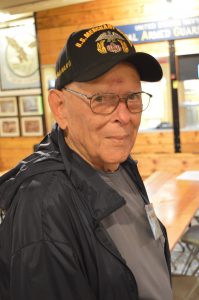
“When I got out, I stayed with fishing and wildlife for a year. Then I went up to Korea for a year and eventually got into mining for 30 years. Not coal mining. That’s not for people. But copper and gold, so everything from the Arctic Circle, Russia, China, Philippines, Indonesia, Australia.
“I can’t say it was a bad life.”
Rick Wobbe, who is accompanying James Sciple for the AMMV Conference, told us his Uncle Henry Wobbe served in the Merchant Marine during WWII.
“Our family is searching everywhere for information about his service. We just found his jackets and such. Ultimately, he got drafted at the end of World War II and landed in the Second Infantry Division, which was sent to Korea. But he wanted to be on the Liberty ships.”
Why?
“I think he thought his survival chances would have been much better. And given what happened to our army at the Chosin Reservoir, you can understand.
“My father, who also served during Korea, went across in one of these troop carrier ships. At the time of his crossing, he told me, there was a World Series baseball game going on.
“The North Koreans said, ‘If you send any ships over here, we will blow them out of the water; we will sink them. So the scuttlebutt on dad’s ship was, these guys didn’t think they were going to make it.
“My father said the morning they got the news of the World Series, people were on deck cheering and he couldn’t figure out who won the game. Well, it wasn’t the game they were cheering. There were four Navy escorts bringing those troop ships into Korea.
“I still get goosebumps when I think about that story.”
Like Thomas Hill and Rosalie Offenhauser, Rick Wobbe is one of the heirs of the Merchant Marine who are determined to keep the largely forgotten maritime service’s heroic history alive.
“You asked the question if I knew about the death toll among the various branches of service,” said Wobbe. “I learned all about the horrendous casualties in the Merchant Marine from a veteran named Carl (Karl) Godert
“Over 50,000 Merchant Mariners died during World War II.
“I wrote a story about Karl. He just recently passed away. Karl told me things I would have never known. It’s a beautiful story about a man who served from the beginning to the end of the war, and what he did in the interim. It’s just absolutely amazing – the history that this man went through, as all of these guys did.”
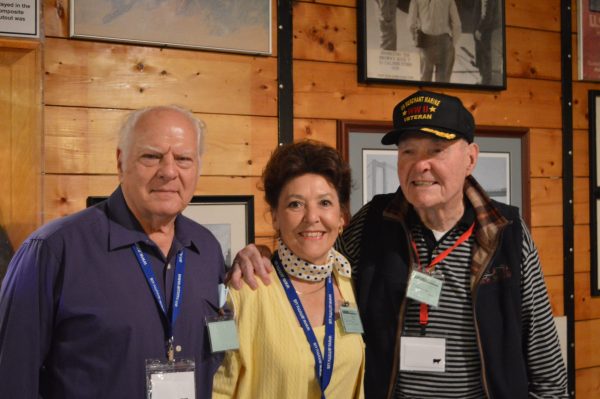
© Copyright 2021 Baltimore Post-Examiner. All Rights Reserved

Anthony C. Hayes is an actor, author, raconteur, rapscallion and bon vivant. A one-time newsboy for the Evening Sun and professional presence at the Washington Herald, Tony’s poetry, photography, humor, and prose have also been featured in Smile, Hon, You’re in Baltimore!, Destination Maryland, Magic Octopus Magazine, Los Angeles Post-Examiner, Voice of Baltimore, SmartCEO, Alvarez Fiction, and Tales of Blood and Roses. If you notice that his work has been purloined, please let him know. As the Good Book says, “Thou shalt not steal.”

